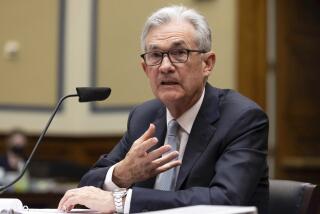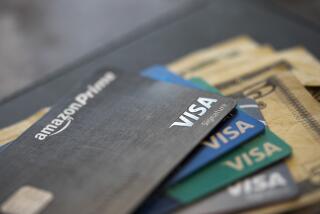The Scoop on 1991 Is the Silver Lining, Not the Clouds
- Share via
Does a bad start guarantee a terrible year, or will the economy recover to turn in a creditable performance? That’s the big question as we begin 1991.
The correct answer, with a wary eye cocked to events in the Persian Gulf, is that there will be a recovery with creditable performance. The economy will be growing again by summer or fall.
But it won’t be easy. It will be a year in business and investing in which you’ll have to read between the lines and have what the football players call a “positive mental attitude.”
Right now, attitudes are understandably negative. Business is paralyzed by the Persian Gulf crisis, unwilling to make major commitments until an outcome is known. In California, cold weather has destroyed the crops.
This month will deliver another shock when the government announces that total output of goods and services--gross national product--declined 4% or so from October through December, 1990, a devastating drop from the previous quarter and the fourth quarter a year ago. The outlook for January-March, ‘91, is for a less severe, 1.5% decline, according to 50 economists polled by Business Week.
That’s the bad news--nearly $300 billion worth of economic activity lost. For that is what recession means: The economy goes in reverse, jobs and business opportunities go uncreated. Pessimism comes easy, as it does when illness strikes. You lie in bed, too ill to accomplish anything, almost forgetting what it is like to be well.
But you do get well--the body heals, the mind recovers. And the U.S. economy will get well in 1991--provided there’s a good and early outcome in the Persian Gulf. Worries over that crisis aside, the outlook for U.S. business is better than the pervasive gloom makes out. There is relatively little unsold product on shelves and in showrooms; inflation is low.
Yes, there are problems--debt-burdened companies, troubled banks. Some will fail. But separate fact from fears: The burden of loan payments is no worse for U.S. companies now than in other recessions, and the credit crunch of the last year will be replaced by more available credit in ’91.
The Federal Reserve, through actions that it began taking in December, is moving to increase bank reserves and lower interest rates. The result will be easier financing for the government deficit, more money in the system and declining interest rates. Economist Henry Kaufman, who heads his own money management and consulting firm, sees Treasury bills at 5% and long-term government bonds at 7% to 7.5% this year.
At such rates home-building will make a recovery after five years of decline, predicts Irwin Kellner, chief economist of Manufacturers Hanover. That will help check rising unemployment, although joblessness may still get to 6.5% of the work force--7.5 million out of work.
The strongest opportunities for U.S. business will come in foreign markets--for export sales and those of U.S. company divisions on scene in Europe, Asia and Latin America.
Computers, for example, offer a tremendous opportunity. Other countries have lagged the United States in adapting computers to their industries, but now their usage is accelerating. Personal computer sales in Japan grew 40% last year to 2.5 million units. Similar growth is likely this year. That compares to roughly 15 million personal computers sold in the United States each year. The point is, U. S. technology is at the heart of foreign computers. Japanese personal computers are built around Intel microprocessors--including those of AST Research of Irvine, a competitor in the Japanese market. Growth in overseas computing also mean increased sales of Microsoft software and thousands of other U.S. products.
And Europe, where U.S. firms dominate the computer field, holds even more promise as national industries try to increase efficiency in preparation for European economic unity.
Oil will offer a challenge in ’91. The price may fall following a settlement in the Persian Gulf, but it will probably come back to roughly $25 a barrel. That won’t raise gasoline or jet fuel prices higher than they are now, but it won’t lower them, either.
Rather, look for the continued high price to spur development work on oil and gas deposits and on fuel efficient aircraft and jet engines--not to mention a revival of research into alternative energy.
So much is riding on the Persian Gulf that economic predictions seem foolhardy. A drawn-out war or lingering standoff would badly hurt the economy and lead to unpredictable shifts in world and national politics.
A peaceful settlement--or successful, quick war--would inspire hope in the world and renew confidence among Americans, which may be what the United States needs most right now.
Separate fact from fear and the odds favor success, with or without gunfire. The economy, and the outlook, will be better this time next year.
More to Read
Inside the business of entertainment
The Wide Shot brings you news, analysis and insights on everything from streaming wars to production — and what it all means for the future.
You may occasionally receive promotional content from the Los Angeles Times.










